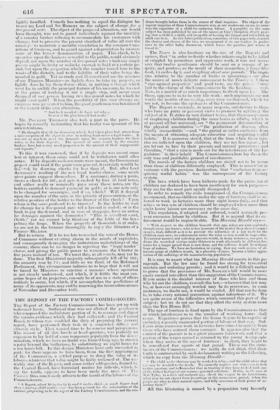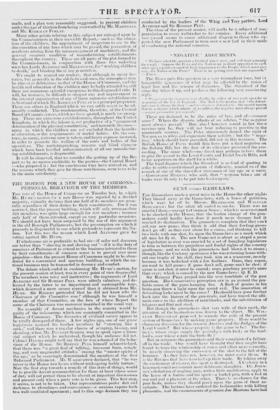THE REPORT OF THE FACTORY COMMISSIONERS.
THE Report of' the Factory Commissioners has been got up with indiscreet haste. Sufficient time was not allowed the gentlemen who composed the ambulatory portion of it, to arrange and digest the various evidence which they hail collected ; and the Central Board, to whom was confided the duty of preparing the general report, haVe pert; wined their task in a somewhat difici ii and slovenly style. They wanted time to be concise anti perspicuous. The reason of all this bustle at head-quarters, vi as probably an eagerness to lay hold of some temporary popularity from the deter- mination, which we have no doubt was formed long ago, to stretch a point beyond the Saalerians, by substituting an eight hours ihr a ten hours bill. In this design Ministers have only succeeded in part: for there appears to have been, from the first appointment of the Commission, a settled purpose to decry the value of its labours,whatever that value might be fairly reckoned at. The un- wieldy size of the Report, and sonic rather odd queries, framed by the Central Board, have furnished matter for ridicule, which, to say the truth, appears to have been made the most of. The Courier thus courteously adverts to the result of the labours of the Commissioners.
" A Report, about 10 inches by 6, and 8 inrhes thich—a much bigger bunk than ((Jib:tory child could e:zny—has been .printed for the information of the curious, purporting to be the report of the Factoty Commissioners, and the evi- dence brought before them in the course of their inquiries. The object of the sapient inquiries of these Commissioners was, as our readers are aware, to aseer- tam the capacities of a child for enduring labour. A pamphlet on the same subject has been published by one of the nurses at Guy's Hospital, elearlv prov- 11Ig that a child is a child, and incapable of hearing the. fatigue and toil which an adult can bear. As this latter publication, consisting of two pages will:, is much the shorter and clearer of the two, we recommend it to our readers it, piefer- ence to the other bulky document, which leaves the question just where it found it."
The Time-v is also facetious on the size of the Report; and Opines, that " in order to decide whether infants ought to be killed or (Tippled by premature and oppressive work, it was not items: sary that twelve gentlemen should be sent on a voyage of' in- quiry, and produce, as the result of their researches, rt blue book, 1-1 inches by 9, and weighing about nine pound's." The inqui- ries relative to the number of births or miscarriages are also the source of much delicate amusement to the TimeN; a 1 these "sins against proportion" and good taste, are the pl.:lee i ones laid to the charge of the Commissioners by the Leading.._ . Now, ill a matter of so much importance, to dwell upon t,,. like the,e, appears to us to be very idle work : such arguments are not ‘vorth the trouble of an-rwciang, even were we disposed, vim jell we are not, to become the apologists of the Commissioners.
The Report is certainly, in many respects, satisfactor3- to those . who have no party or personal views to promote by agitatieg the sulject of it. It states in very distinct terms, that the censeqeences of' employing children during the same hours as adults, which is at present all but universal,. are " the permanent deterioration of the physical constitution ---" the production of disease, often wholly irremediable "—and " the partial or entire exclusioe front the means of obtaining adequate education and acquiring neful habits." It is moreover stated, that at the time Nvheu th(-se inju- ries are inflicted upon the children, they are not free agents, but are let out to hire by their parents and natural protectors; and therefore, " that a case is made out for the interference of the Le- gislature " in their behalf. The Commissioners here lay due a the only true and justifiable ground of interference.
The morals of the factory children are stated not to be worse than those of children differently- employed. This is somewhat at variance with the previous declaration, that " exclusion front ac- quiring useful habits was the consequence of the factory system.
The laws which have been hitherto made for the protection of children are declared to have been insufficient for such purpose— they are for the most part openly disregarded.
Itl order to remedy the evils complained of, the Commissi.iners recommend, that no children under the age of fourteen shall is al- lowed to work in factories more than eight hours daily, trod that relays or two sets of children should be employed when more than eight hours' labour are necessary on the same day.
This regulation, if adopted and enforced, would certainly pre- vent excessive labour by children. But it is argued that its en- forcement would be impracticable. The Morning Herald says- " Witil respect to the children beneath tint age, relays are contemplated ; though every one knows, who is less ignorant of the matter than these Goinnis- shiners, that, difficult as it is to prevent the tatactiout of a law ntade for the chihlren even now, its enforcement under the relay system would be imp,,,,itde. Tyrannical masters and unfeeling parents would, in many instances, conspire to doom the wretched victims under thirteen to work alternately in (Iiiliment fac- tories for a longer period than is now done, and the sufferers would . be without hope of redress. We have no hesitation in saying, that ;toy such system of al- ternate gangs of children would, in a plurality of eases, become a bitter aggra- vation of the sufferings of the manufacturing population."
It is easy to assert what the Morning Herald asserts in this pa- ragraph. But the law may be found too strong for tyrannical toasters and unfeeling parents; and it would be a difficult matter to prove that the provisions of Mr. SADLER'S bill would be more easily carried into effect than this suggestion of the Coonnissioners. If you make it the decided interest of those who hire and those who let out the children, to evade the law,—whatever that law may be, or how ever cunningly worded may be its provisions, in sotne instances, we doubt not, it would be evaded. All that can be done is, to take every rational precaution against infractions of it. We are quite aware of the difficulties which surround this part of the sul)ject; but we do not see that they affect the relay system more than the Ten Hours Bill.
The age of fourteen is fixed upon by the Commissioners as that at which interference as to the number of working hours shall cease. Experience proves that the frame begin.; to be capabie of enduring a greatly augmented portion of labour at that ii c. Sur- 1.,•rers front excessive work in factories have almost y been t hese who have entered them younger. It appears also hat the control of the parents is in a great measure thrown oh, and that a portion of the wages earned is retained by the young worhpeople when they arrive at the age of fourteen : in short, they begin to be considered free agents at that period. Theeie are the state- ilints of the Commissioners: we really do not think that their truth is controverted by such declamatory writing as the ftllowing, which we copy from the Morning Herald- " The child under thirteen mar be worked in relays, and the child abort' that r.A-e usav be worked to the death. We earnestly implore our statesmen to look to this ■luestion, and tolPtunember that in treating it they have to deal with one of tho- holiest ler:hags-of our nature—parental solicitude. If this, in the case of Witt Tyler, in a dark and enslaved age, shook the empire to its foundations, what may we not expect from its outrage at this momentous period, when the people are alive to their natural rights, mind fully conscious of their power of as- serting them ?"
All this blustering is caused by a proposition very honestly
made, and a plan very reasonably suggested, to prevent children under the age of thirteen from being overworked by Mr. MARSHALL and Mr. KIRKMAN FINLAY.
Many other points relating to this subject are enlarged upon by the Commissioners in their unwieldy- Report,—such a the educa- tion of the children, the appointment of inspectors to see to the due execution of any laws which may be passed, the prevention of .accidents arising from the mismanagement of machinery, and the general sanatory condition of manuflicturing establishments througbout the country. These are all parts of the plot formed by- the Commissioners, in conjunction with those two unfeeling wretches Lords ALTHORP and MoLkottasE, fin" working children to death," and blasting the ri iie gt iteration.
We ought to remind our readers, that although in melv flic- tories, but generally in the old-fashioned Ones, the annosphere may he almost as deleterious as that of the House of Commons, and the health and education of the children may be badly attended to, still there are numerous splendid exceptions to this disgraceful rule. It will, for instance, be difficult to suggest any real improvement in the internal organization of any of those extensive establishments in Scotland of which Mr. KIRKMAN FIN:. AY is :1 principal proprietor. There are others iii England which we can satily assert to be ad- mirably conducted. The condemnation, therefore, of the Central Board of Commissioners, which we have quoted, is much too sweep- ing. There are numerous establishtnents, throughout the United Kingdom, in which the labour ia out productive of a " permanent deterioration of the physical constitution," and incurable diseases— many in which the children are not excluded from the benefits of education, or the acquirements of useful habits. On the con- trary, in many, extreme care is taken, and heavy expense incurred, in order to promote the welfare of the souls and bodies of the operatives. The undistinguishing censure anti blind ciente:Li- which have been levelled indiscritninately at all our manufactur- ing establishments, is disgraceful.
It will be observed, that we consider the getting up of the Re- port as by no means creditable to the parties—the Central Board —who prepared it : but the conclusions they have arrived at, and the reasons which they give for those conclusions, seem to us to be in the main satisfactory.

















 Previous page
Previous page